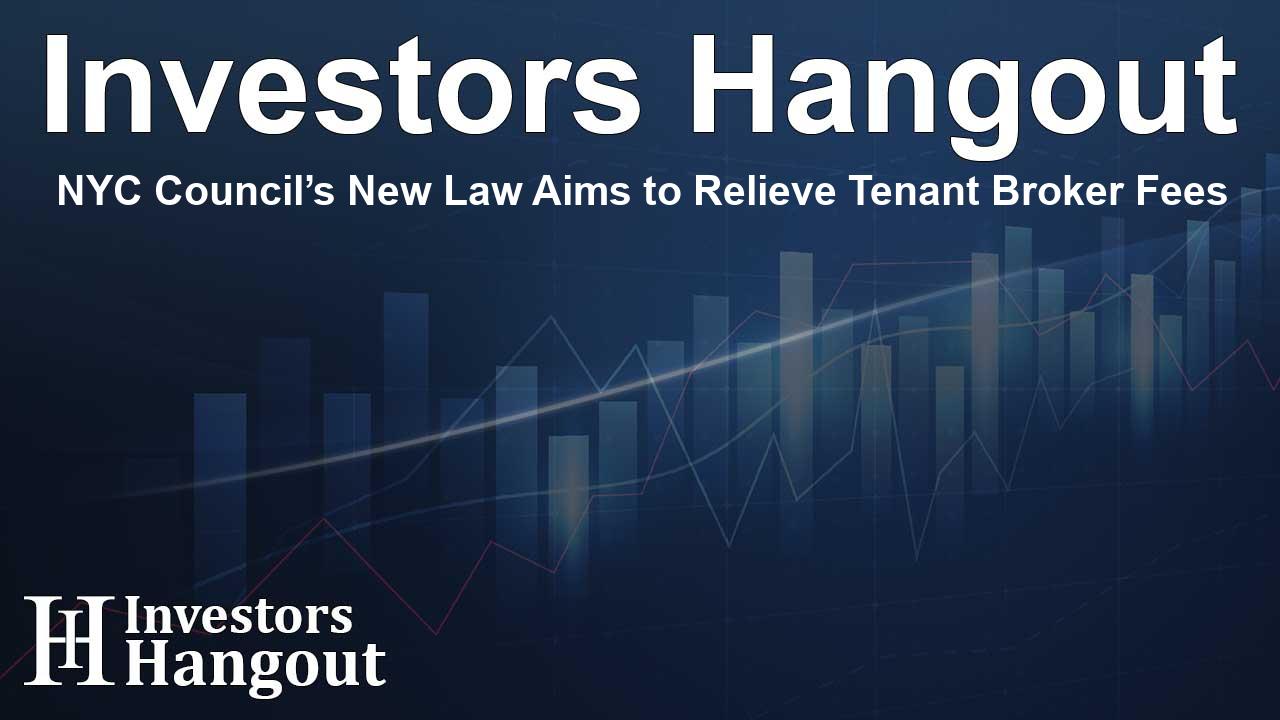NYC Council’s New Law Aims to Relieve Tenant Broker Fees

NYC Council's Revolutionary Move on Broker Fees
Renters in New York City are finally seeing some light at the end of the tunnel as the City Council approves a groundbreaking legislation that abolishes tenant-paid broker fees. For years, these fees have been a hefty burden for many, often amounting to thousands of dollars needed for initial moving costs.
A Major Shift with the FARE Act
The recently passed Fairness in Apartment Rentals (FARE) Act received overwhelming support with a veto-proof vote of 42-8. This significant legislation shifts the financial responsibility of broker fees away from tenants and places it on landlords and management companies who utilize these agents.
Implementation Timeline
This new law is set to come into action within 180 days from the date of signing, promising to reshape the renting dynamics in the city.
Challenging the Status Quo
Despite the city being known as one of the priciest rental markets in the nation, many tenants have been subjected to broker fees reaching as high as 15% of their first year’s rent. Renowned strategist Bradley Tusk highlighted the plight of renters, insisting that "New Yorkers have been getting ripped off for decades." His commitment of $10,000 to aid in the bill's implementation showcases the urgent need for this change.
Concerns Over Rent Increases
The bill, introduced by City Councilmember Chi Ossé, has also evoked concerns regarding potential rent increases as landlords may try to recover the lost income from broker fees. Ossé reassured the public that a significant percentage of rental homes are rent-stabilized, making it illegal for landlords to offset these fees through raised rents.
Industry Opposition and Warnings
However, pushback from the real estate sector is strong. Ashley Murphy, a senior vice president at a leading real estate firm, expressed her apprehensions that forcing landlords to absorb broker fees could lead to increased rents, potentially impacting every new lease agreement. She noted that any adjustments to lease terms could disproportionately hurt current tenants during renewal periods.
Transparent Fees Scheduled for Disclosure
To safeguard tenants further, the legislation mandates that landlords must transparently disclose all tenant-related fees in their rental listings and agreements. Violations will incur penalties, beginning at $1,000 for a first offense and escalating to $2,000 for subsequent violations within a two-year timeframe.
Mayor Adams’ Cautious Approach
NYC Mayor Eric Adams shared his reservations about the potential unintended consequences of the bill. He noted that while the intentions are noble, good intentions do not always guarantee favorable outcomes. This could lead to ripple effects within the rental market.
The Role of the Department of Consumer and Worker Protection
The Department of Consumer and Worker Protection is tasked with enforcing the new law, with authority to pursue civil penalties and restitution when necessary. This ensures that tenants have avenues to address grievances stemming from violations of the new legislation.
Light at the End of the Tunnel for Tenants
The passing of the FARE Act marks a significant milestone in the journey towards fairer rental practices in New York City. The expectation is that this new law will alleviate some of the financial strain on renters while also enhancing transparency and accountability in the rental market.
Frequently Asked Questions
What does the new law entail for tenants in NYC?
The new law eliminates broker fees that tenants have previously been responsible for, shifting that financial burden to landlords.
Who will pay the broker fees under the FARE Act?
According to the act, landlords and management companies will now be accountable for broker fees instead of tenants.
When will this law take effect?
The legislation will go into effect within 180 days of its signing.
How will landlords disclose fees to tenants?
Landlords are required to transparently list all fees associated with renting properties in their listings and agreements.
What penalties do landlords face for violations?
Landlords face fines starting at $1,000 for initial offenses and $2,000 for repeat offenses concerning tenant fee disclosure violations within two years.
About Investors Hangout
Investors Hangout is a leading online stock forum for financial discussion and learning, offering a wide range of free tools and resources. It draws in traders of all levels, who exchange market knowledge, investigate trading tactics, and keep an eye on industry developments in real time. Featuring financial articles, stock message boards, quotes, charts, company profiles, and live news updates. Through cooperative learning and a wealth of informational resources, it helps users from novices creating their first portfolios to experts honing their techniques. Join Investors Hangout today: https://investorshangout.com/
Disclaimer: The content of this article is solely for general informational purposes only; it does not represent legal, financial, or investment advice. Investors Hangout does not offer financial advice; the author is not a licensed financial advisor. Consult a qualified advisor before making any financial or investment decisions based on this article. The author's interpretation of publicly available data shapes the opinions presented here; as a result, they should not be taken as advice to purchase, sell, or hold any securities mentioned or any other investments. The author does not guarantee the accuracy, completeness, or timeliness of any material, providing it "as is." Information and market conditions may change; past performance is not indicative of future outcomes. If any of the material offered here is inaccurate, please contact us for corrections.